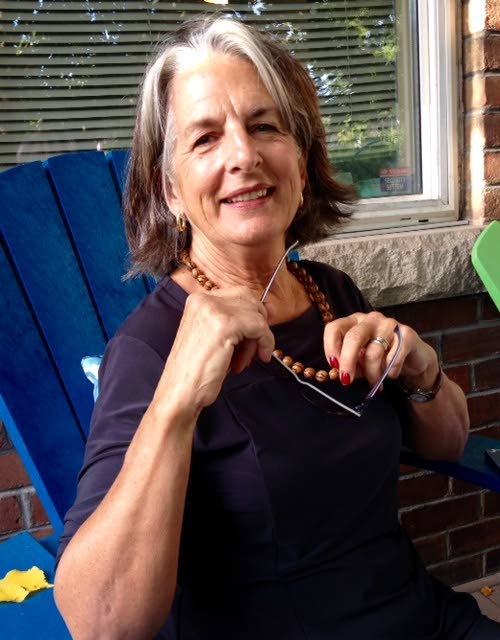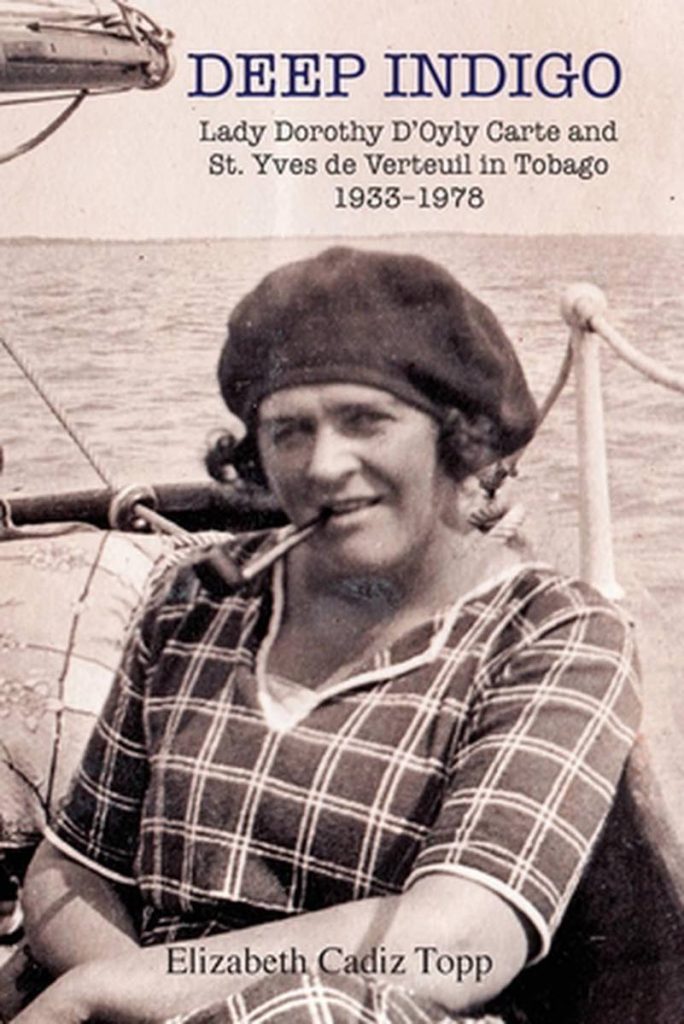Deep Indigo: A romance from D’Oyly Carte Island to Tobago

CHRISTOPHER PINHEIRO
Trinidadian Nobel laureate Sir VS Naipaul decreed that “style and drama are basic human needs.” Both of these qualities are to be found in abundance in of Elizabeth Cadiz Topp’s book Deep Indigo. This is an epic adventure worthy of Gabriel Garcia Marquez and could be subtitled: Love in the Time of Malaria.
With her background in the fine arts and lived experience in filmmaking, Topp’s descriptions are vivid and visual, embroidered with detailing from architecture, fashion, interior design and the great outdoors. She brings you into the scenes with charm and grace.
Just two examples can illustrate the many aspects of style and drama.
Two spinster sisters, diminutive great-aunts of the author (think Lillian and Dorothy Gish) are performing their ablutions, submerged in the “austere concrete bathhouse at the back…wearing white linen chemises with yoke panels of hand-sewn tiny tucks interspersed with lace, and then sit, soaking wet, fanning with large straw fans in the tropical heat. A maid brought them iced mangoes and oranges on a wooden tray, as the breeze gently dried their chemises…”
Another pumpkin-vine family member succumbs to the dreaded leprosy, for which, at the time, there was no cure. Returning to Trinidad by boat from a hospital in France, 14-year-old Maxime is visibly suffering from the disease, considered untouchable and scorned by fellow passengers. “On arrival in the harbour of Port of Spain they refused to have him join them in the tender taking them to shore. Instead, he was brought, shrouded in white bandages, in the dead of night in a row boat manned by a de Verteuil cousin, from the ship anchored in the Gulf of Paria to the …wharf.”
The dramatis personae of Deep Indigo are a formidable cast of thousands of speaking (or singing) parts – extras, all told. The centre-stage love story is that of the author’s great-uncle, St Yves de Verteuil, and his English wife, Lady Dorothy D’Oyly Carte. For both of them, it was a second marriage, in the autumn of their lives. D’Oyly Carte, who was somewhat younger, outlived St Yves by many years.
The Deep Indigo of the title references the colour of the sea, as well as the blue blood of the de Verteuil clan, who can trace their ancestry in France to well before the Reign of Terror and involves service in the courts of many different Louis.
Lady Dorothy’s aristocracy was of a relatively newer vintage, from a family that had made its fortunes in the iron-furnaces of Yorkshire. Set against St Yves’ indigo, her blue was rather a pale aquamarine.

Their torrid-zone romance spanned eras, continents, monarchies, treacheries, world wars, traumas and islands. Islands in the stream of consciousness, from D’Oyly Carte Island in the Thames, to Madeira, Crete, the Hebrides, Caledonia Island, Pigeon Island, Trinidad and finally Tobago, where Dorothy dropped anchor, died, and was buried in Plymouth, close to the sea which she and St Yves loved so dearly and sailed so avidly.
On Monos Island was Ma Toquade (My Whim), where there was a sprawling de Verteuil house with wraparound verandahs. Offloaded for holiday sojourns, in addition to personal baggage, would have been coops of live chickens, suckling pigs and a cow, for fresh milk!
The Savoy Theatre in London, which was the first to be lit by electricity, was the venue for the D’Oyly Carte Company’s productions of the comic operas of Gilbert and Sullivan. They were also performed by franchising, all across the British Empire, from Australia to Canada, India to the Caribbean, where they were enthusiastically received, with their absurdist plots, witty ditties and melting melodies.
The theatre business was later to expand into adjacent hotel and restaurant businesses. lush, opulent and gourmet. There was a scandal involving fraud, larceny and embezzlement on the part of the chef and the manager, to the tune of millions. The offending parties were “let go,” but the matter was hushed up lest it upset the aging and ailing Queen Victoria, whose son, the Prince of Wales, was in the habit of entertaining his 55 known mistresses at The Savoy!
The book also explores D’Oyly Carte’s political activism. Having been aware of the activities of the suffragettes, she took up the cause of women in Tobago, and ran for elected office in 1953. In the parish of St David, she campaigned for a seat on the County Council (with her symbol being a heart) and won!...By a clear 200-vote advantage over her nearest rival, Tobagonian APT James.
D’Oyly Carte and de Verteuil had previously raised enough money for a community centre in the village of Plymouth. She became chair of the Plymouth-Bethesda Community Council and held this position for many years. Her guiding motto for her humanitarian endeavours was a biblical quote from Luke 12:48: “From everyone to whom much has been given, much will be required.”
Before the terms became known or fashionable, D’Oyly Carte was an environmentalist and conservationist. There is a sequence of her, on a darkened beach, guarding the birth labour of leatherback turtles against poachers, that is both magical and moving.
The question is never actually asked, but one wonders to what extent the ebullience of the French Creole character has influenced the ethos of the Trinidadian persona. Many more memoirs of this nature would be most welcome additions to the bookshelves of readers interested in the diverse charms of Trinidadiana.
Deep Indigo is available at the Paper Based Bookshop, Hotel Normandie or online from sites including amazon.com. More details at https://www.deepindigobook.com/

Comments
"Deep Indigo: A romance from D’Oyly Carte Island to Tobago"